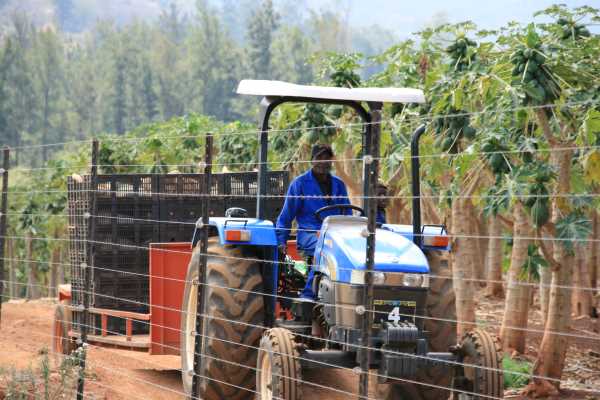Land Reform – The private sector can play a significant role in land reform efforts aimed at alleviating deepening levels of poverty among rural communities by helping to unlock opportunities and revitalise those economies, says Nozizwe Vundla, Head of the Sanlam Foundation.
Vundla further said that all stakeholders, including the private sector, can support the growth and development of emerging farmers by providing the requisite support to structure partnerships that will increase their land productivity and commercial viability. This in turn will give them the leeway to improve their income and capacity.
As part of its contribution to supporting initiatives to re-energise rural economies, the Sanlam Foundation has to date donated R5 million to the Vumelana Advisory Fund (Vumelana), a non-profit organisation that works with land reform beneficiaries to make their land productive. A portion of the funds has been used to support the Coromandel Farmers’ Trust in Mpumalanga to conclude two lease agreements for the development of its land. Support was provided over an 18-month period, after a successful land redistribution for agricultural development transfer in favour of the Farmers’ Trust. The facilitation of agreements includes equity for the Trust in the businesses that produce pome orchards, winter cereals, blueberries, and commercial cattle production. The Coromandel Trust owns 5 800 hectares of land and represents 248 households in Lydenberg. This intervention is likely to benefit an average of about 870 individuals comprising 51% women, 34% youth and 0,065% physically challenged based on Stats SA averages.
“Sanlam believes the private sector has an important role to play in helping remove the barriers that hamper communities to fully participate in mainstream socio-economic activities. We are confident that through the Foundation’s intervention, these initiatives that tackle persistent challenges to beneficiaries of the land reform programme and marginalised members of society, including issues such as market access, lack of networks and a shortage of the necessary skills, will enable them to participate in the economy.
“Sanlam’s purpose is to empower generations to be financially confident, secure and prosperous. In line with our purpose, we are always looking at ways to positively impact the communities that we serve. We are of the view that Vumelana Advisory Fund’s work complements the Foundation’s objectives, as the NPO seeks to support communities in fulfilling the commercial potential of the land that has been returned to them,” says Vundla.
She notes that land reform, especially in rural areas, has been a tool used to rectify the historical socio-economic imbalances and to address racially and gender skewed land ownership patterns. Land ownership can also serve an important role in reducing poverty and supporting sustained growth in line with the objectives of United Nations’ Sustainable Development Goals (SDGs).
To that end, Vundla says all stakeholders, including the private sector, can support the growth and development of emerging farmers by providing the requisite support to help them structure partnerships that will increase the output on their land to be productive and commercially viable. This support can also give them the leeway to improve their income and ramp up their capacity.
“Without a doubt, land has productive value, and those whose access has been restricted have been unable to enjoy the economic benefits and income generation potential that production on land can offer. Land restitution has yielded some positive results, but not nearly enough. It appears that land restitution must take place at scale for us to see the developmental needle shift in the right direction so far as it pertains to land reform,” says Vundla.
Since investment in the land reform programme is largely unchartered terrain for the private sector, Vundla advises potential investors to partner with organisations that have a proven track record.
“As in any business environment, the efforts that we are part of are not risk proof. Some instances will be smooth, predictable, and successful while others will require a lot more work. South Africa’s land reform terrain is vast and is contested as shown by a wide range of interests for the use of farmland, which can compete at times. Some need ground for housing and services, others for property development, others for food production, still others for conservation and some for extractive use.
“Our work with Vumelana has allowed us to have a dedicated entry point to test a solution for cases where land has already been provided by the state to those that are deserving. This has enabled the Sanlam Foundation to test what is possible within a confined space in land reform, and to start answering the question of what happens once terrain has been transferred to beneficiaries. We acknowledge that this is a vast area of need with potential solutions, but we need to keep trying to find meaningful solutions for this enormous challenge facing South Africa,” says Vundla.
Peter Setou, Chief Executive of the Vumelana Advisory Fund, echoes Vundla’s sentiments and adds that the widely reported failure of beneficiary communities to productively work their land can be primarily attributed to lack of post-settlement support of the claimant communities. This leads to the beneficiary earth lying fallow or being used sub-optimally in subsistence farming due to absence of much-needed capital, equipment, access to water rights and markets.
“Allocating land to communities and walking away does not serve the interests of these new landowners, many of whom lack the skills, capital, and technical capabilities to make a livelihood out of this territory. Equally, the state does not have the requisite capacity to provide support to the new landowners. The private sector can plug this gap and come up with innovative and customised partnership models that will ensure that they receive a return on their investment, while also ensuring food security and imparting much-needed skills to beneficiary communities. These partnerships, however, do not happen naturally. They need independent facilitation to ensure fairness and sustainability. This facilitation unfortunately requires funding, to which the private sector and other players can contribute. In this regard, Sanlam Foundation has taken the lead in recognising this and supporting our initiatives to ensure productive use of restored land,” says Setou.
In a country whose rural population stands at 32.15% in 2021, according to the World Bank collection of development indicators, these communities are among the worst affected by the rising poverty levels. It goes without saying that the success of the land reform programme cannot be over emphasised.
“The private sector needs to see itself as an important role player that can ensure the success of the land reform programme through engaging with all the relevant stakeholders and availing its expertise to them. Working with beneficiary communities, the private sector has an opportunity to support the creation of joint ventures and initiation of commercially viable initiatives. Through these independently facilitated partnerships, communities will access much-needed expertise such as access to infrastructure, agronomic inputs, technology and technical expertise, to capital and to markets,” says Setou.
Working with beneficiary communities, Vumelana has successfully deployed a community/private partnerships (CPPs) model where the new landowners enter a win-win partnership with a private sector investor for the management of the land.
“We have seen several case studies where participation in the land reform programme by the private sector has addressed the competency gaps for beneficiary communities by facilitating access to markets and finance, and has spurred investment in production and employment and led to skills transfer. However, there is no one-size-fits-all approach, and therefore the composition of the CPPs should be tailored to the unique circumstances of each case. This requires independent facilitation to which the private sector can contribute,” Setou concludes.








